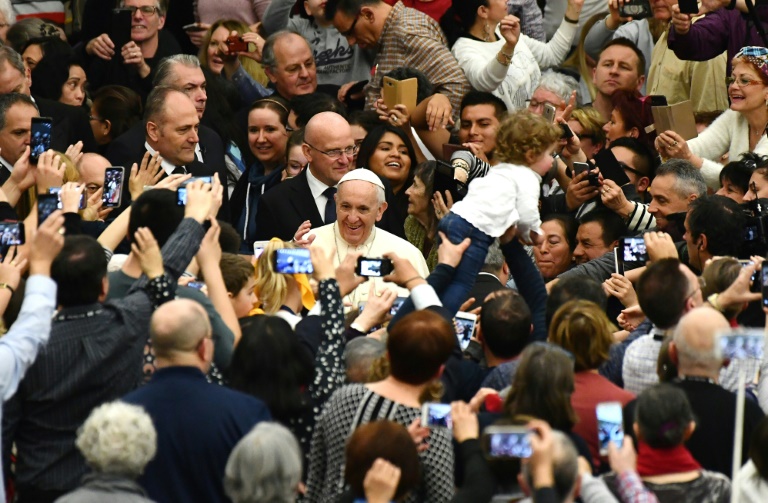Sweltering heat and dry taps: 86-hour water outage nears end
The sex abuse scandals that have rocked the Church may have cast a shadow over his papacy as it enters its fifth year on Tuesday.
However, the 81-year-old Argentinian has helped to facilitate a historic rapprochement between the United States and Cuba, played a role in the peace process between government forces and rebels in Colombia and thrown the power of the Church into the fight against climate change.
Born in Buenos Aires on December 17, 1936, the erstwhile Jorge Bergoglio is the first pope from Latin America and the first from the southern hemisphere.
He has championed the cause of the marginalised and the developing world, says he wants a “poor church for the poor” and a Catholic community which preaches mercy and understanding in the application of its teaching.
He was arguably the first global leader to grasp the scale of the migration crisis now engulfing Europe, railing against the “globalisation of indifference” on a visit to Lampedusa in July 2013, three months before two sinking disasters off the Italian island catapulted the issue onto newspaper front pages.
In April 2016, he flew to another island on the frontline of the migrant crisis, Lesbos, and returned to Rome with three families of Syrian Muslims in a gesture that underscored another of the dominant themes of the Francis papacy: interfaith reconciliation.
In May 2014, at the Israeli wall surrounding the Palestinian territories, he prayed, in silence, for its disappearance.
Such agenda-setting gestures have made the world beyond the confines of the Church sit up and take notice.
In his first year of office, Francis graced the covers of no fewer than three major US magazines: Time made him their 2013 person of the year, Esquire declared him their best-dressed man and Rolling Stone just declared: “He rocks.”
– Driving change –

Pope Francis’ penchant for having ‘selfies’ taken with fans has given him an easy, popular touch
With his penchant for having selfies taken with fans, kissing babies and making surprise phone calls to lonely widows, the smiling, bespectacled pontiff has an easy, popular touch.
That has helped him command a level of popularity his dour academic predecessor Benedict XVI could only dream of.
It has been a valuable asset as he has taken on vested interests in the Vatican hierarchy and the broader Church to push internal reforms, even if critics say some of those have now stalled.
Vatican insiders describe a leader with the business executive’s capacity to make quick decisions.
In his five years in charge, Francis has shaken up and streamlined the Vatican bureaucracy and brought 21st-century auditing to the murky structures of the Holy See’s banking system.
He has sought to tackle the enormously damaging scandal over sex abuse by priests by meeting victims, vowing to hold those responsible accountable and enacting new internal Church procedures to discipline bishops implicated in cover-ups.
He also set up a Pontifical Commission for the Protection of Minors to help deal with the scandal.
But his critics say the Church remains too reluctant to hand paedophile priests over to civil authorities.
– No palaces –
Modesty and humility are key components of the @Pontifex package.
An iron — not gold — cross and discrete, unostentatious clothes contrast with the fur-trimmed satin cloaks favoured by his predecessors.
He lives in a modest flat in St Martha’s, a Vatican boarding house, having eschewed the option of a lavish Papal palace. Sumptuous summer facilities at Castel Gandolfo also go unused.
Holidays are not for this pope in a hurry, who has regularly hinted at a belief he will only survive a few years in the job.
When he opened the first round of a review of Church teaching on the family in October 2014, he told participants to follow his lead and speak honestly, “even if you think it will offend your pope”.
His reform agenda on issues such as allowing divorced and remarried believers to take communion has run into opposition from conservatives, with whom Francis agrees on many other issues.
He denounces abortion as fervently as any cleric on the planet. To the dismay of many anti-poverty and women’s rights activists, his Church has no inclination to overturn its ban on artificial contraception.
And to the dismay of many liberals, there is no space for gay marriage in his vision of how society should organise itself.
Yet the world outside may see a bigger picture, one of a Church adapting to the modern world: an organisation that once universally condemned homosexuality as a kind of sickness now being led by a grandfatherly figure who hugs his gay friends and sums up his attitude to homosexuality with the phrase: “Who am I to judge?”
Download our app and read this and other great stories on the move. Available for Android and iOS.